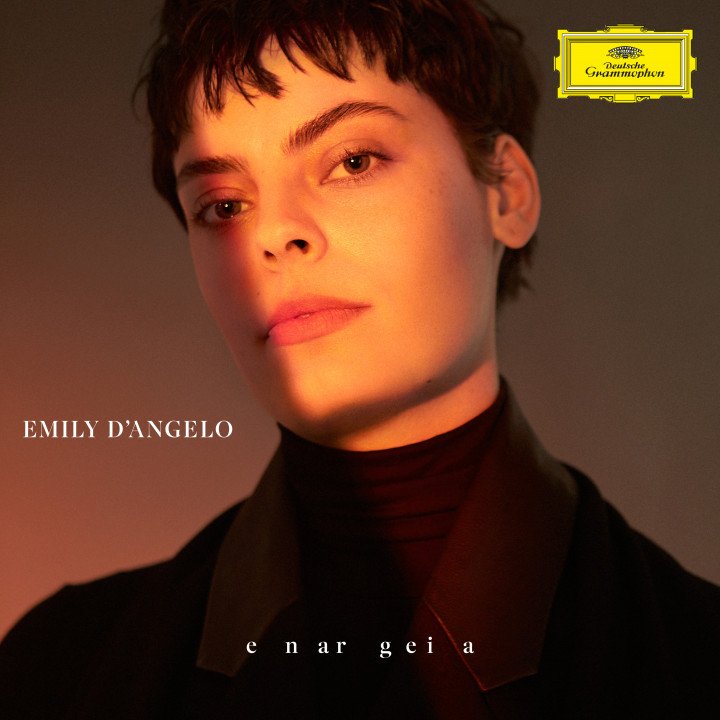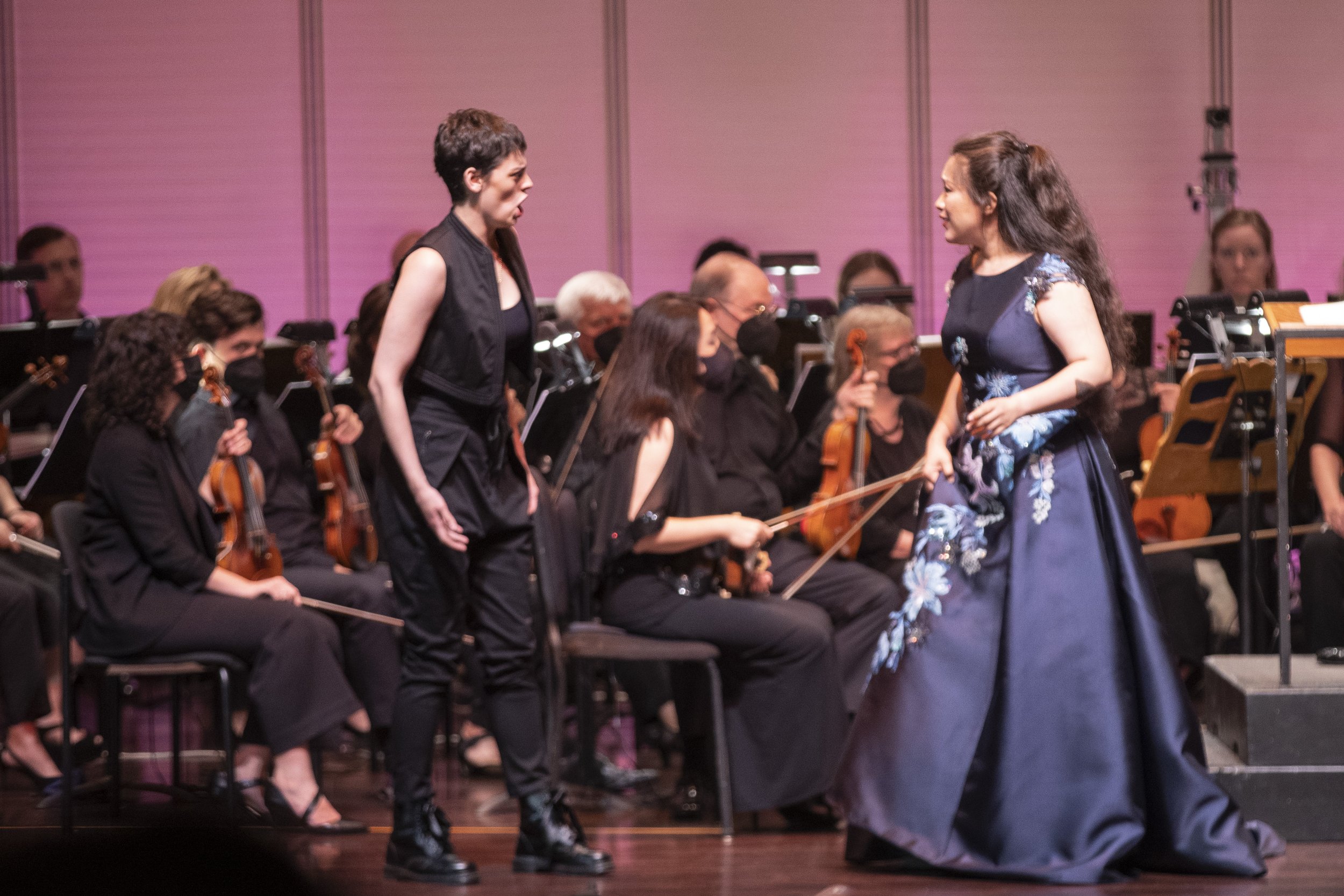By Wynne Delacoma
“It was the silver lining of the pandemic.”
We’ve all searched for silver linings since March 2020 when the Covid-19 pandemic completely upended everyday life around the world. The precious slice for Canadian-born mezzo-soprano Emily D’Angelo found was time.
By early 2020, the young singer’s career was in high gear. She had won important international competitions, was an alumna of the Metropolitan Opera’s prestigious Lindemann Young Artist Development Program, and was named a 2020 Lincoln Center Emerging Artist.
Emily D’Angelo made her solo-album debut on the vaunted Deutsche Grammophon label with a brilliant, original collection of songs, several of which are featured on her first solo Ravinia program, August 17.
Suddenly facing a calendar of canceled and postponed performances, D’Angelo instead saw that she finally had time to focus on her debut CD. Titled enargeia, the album was released to critical acclaim last October on the Deutsche Grammophon label. With tracks stretching from arrangements of plainchant by the 12th century composer Hildegard von Bingen to compositions by contemporary Americans Missy Mazzoli and Sarah Kirkland Snider, enargeia made National Public Radio’s list of 50 best albums of 2021.
D’Angelo will perform selections from the album on August 17 in the Martin Theatre. Accompanied by pianist Kevin Murphy, director of the Ravinia Steans Music Institute Program for Singers, her recital program offers an even wider range of composers. The lineup includes songs by Arnold Schoenberg, Florence Price, Aaron Copland and a cantata, Giovanna d’arco, by Rossini. (D’Angelo has just completed two performances as Sesto in Mozart’s La clemenza di Tito with the Chicago Symphony conducted by James Conlon on the same stage, August 12 and 14.)
D’Angelo gave two standout performances in Mozart’s La clemenza di Tito at Ravinia: “Her Sesto streaked out of the gates as a production highlight and stayed there,” wrote the Chicago Tribune. “Her buttery voice thrilled in every register; if its lower reaches were autumnal, they were a New England autumn, blazing with tempera-bright intensity.”
“It took a lot of time to come up with the concept and select repertoire [for the album], to really solidify something that was cohesive,” said D’Angelo in a mid-July Facetime call from Paris where she was wrapping up performances of Gounod’s Faust at the Paris Opera. “There was the ability to have the time to think about that.”
The impetus for the album, she said, was Hildegard. Born in 1098, the abbess of a community of German Benedictine nuns and renowned in her day as a gifted composer, philosopher, mystic, and scientist, Hildegard was rediscovered by feminist scholars in recent years. The Catholic Church canonized her as St. Hildegard von Bingen in 2012.
“I was always interested in creating a project that revolved around her,” said D’Angelo. “She was a modern, modern figure, so multifaceted and interdisciplinary in so many ways. She was a thinker, a creator, a scientist in her own way, and a leader whom other people turned to for guidance in more ways than one. When I was in a children’s chorus—that was a big part of my musical upbringing—we performed plainchant by Hildegard von Bingen. I was totally mesmerized. It stuck with me, and I thought, this needs to be revisited.”
Figuring out how to structure an album inspired by Hildegard’s haunting plainchant was not easy, said D’Angelo. Based in Berlin during the pandemic, she started discussing the idea with colleagues, including sound engineer Jonas Niederstadt. He connected her with Jarkko Riihimäki, an arranger, composer, and pianist with experience ranging from classical to pop music and electronics. “Everyone involved with this album was multidisciplinary in some way,” she said, “starting with Hildegard and all the way through the sound engineer. It was very collaborative.”
“Hildegard was a modern, modern figure, so multifaceted and interdisciplinary in so many ways. She was a thinker, a creator, a scientist in her own way, and a leader.”
D’Angelo wanted to find a “sound world” that reflected her response to Hildegard’s intensely contemplative music. The 12-track album includes two chants by Hildegard: one arranged for voice and solo cello by Mazzoli, the other for string quartet and voice by Snider.
“The question was, will you have her pieces arranged [for instruments as well as voice]?” said D’Angelo. “Will you perform them in their original form? What do you juxtapose that with? I was really thrilled that our modern composers were so open to exploring her music with me by creating these arrangements. In the end we decided it would be a combination of new repertoire and the oldest of Western music.”
Enargeia also includes four songs by Mazzoli, four by Snider, and two by contemporary Icelandic composer Hildur Guðnadóttir. Like Hildegard’s plainchant, the contemporary works have strongly etched melodic lines supported by a deeply rich emotional undercurrent. D’Angelo hit upon the album’s title while doing preliminary research on Hildegard. A word from ancient Greek rhetoric, enargeia is roughly equivalent to “extreme vividness, radiance, or presence.”
“Nothing could be random or out of left field,” said D’Angelo. “The pieces all had to be connected on many different levels for there to be a cohesive product. It’s an experience; it’s a listening experience that needed to be an album. That’s a big ask these days, when it’s all streaming services and playlists and short, catchy hits.”
Of course, creating an effective album is not the same as shaping a memorable recital for a live audience, which is why D’Angelo’s Ravinia program is so varied.
“It’s not dissimilar to creating an album,” she conceded, “in that you’re looking for an arc, a unified experience. But it’s a totally different medium. It’s live. You have to consider vocal pacing, dramatic pacing.”
She has performed recitals built around the album several times during the past year.
“I have a core recital, but it’s constantly in flux. It changes depending on the acoustics, the time of year, the location, certainly the country. We’ve performed this in Stockholm; we recorded it in Berlin in the dark of winter. Ravinia is a summer festival, so Kevin and I have given a sort of summer festival twist on a rather moody recital.” Down by the Salley Gardens, a folk-flavored ballad from 1919 by British American composer Rebecca Clarke, is one of the sun-kissed additions.
Since the pandemic has eased, D’Angelo has returned to the opera stage, singing leading roles at Covent Garden in London, La Scala, and the Berlin and Bavarian state opera houses. But recitals were always her first love. Her solo recital and Mozart opera performances mark her Martin Theatre debut, but she is no stranger to Ravinia. A fellow at the Ravinia Steans Music Institute in 2015 and 2016, she has fond memories of hearing concerts in the intimate Arts and Crafts theater.
“Steans had a huge impact,” D’Angelo said. “I was 19 or 20; I met my teacher there [Steans faculty member mezzo-soprano Patricia McCaffrey], and Kevin has stayed in my life since then. The amount of time you could really dedicate to recital repertoire is something I feel so lucky to have had. Most of my study was actually not in opera; it was in concert and recital repertoire. To be able to continue working with pianists and coaches and singers on that repertoire was so exciting and really pivotal for me.” ●
Wynne Delacoma was classical music critic for the Chicago Sun-Times from 1991 to 2006 and has been an adjunct journalism faculty member at Northwestern University. She is a freelance music critic, writer, and lecturer.




